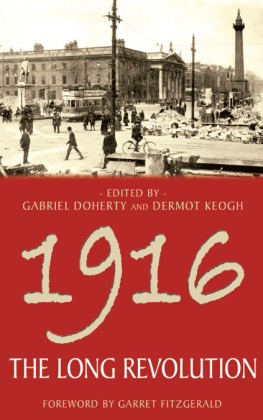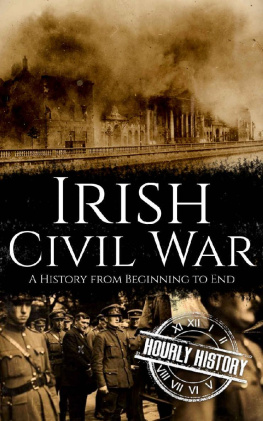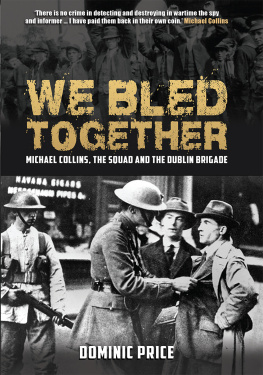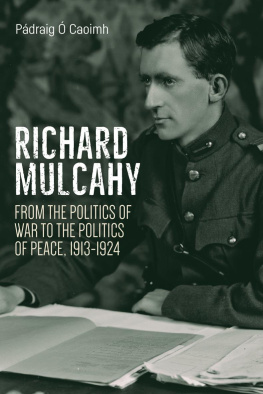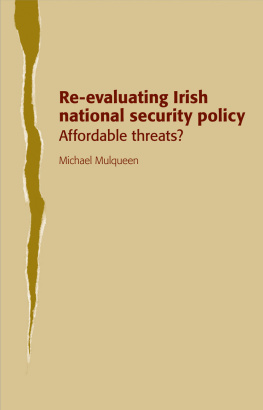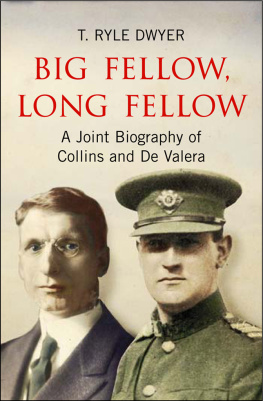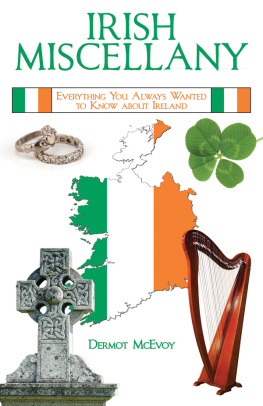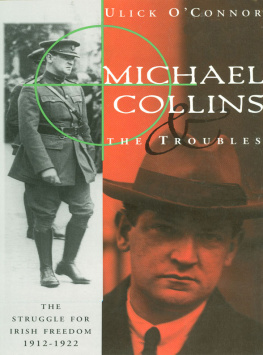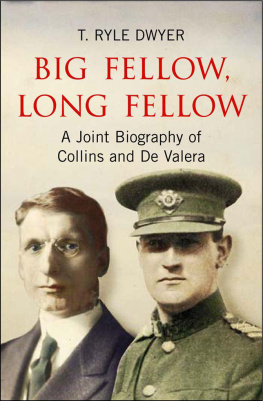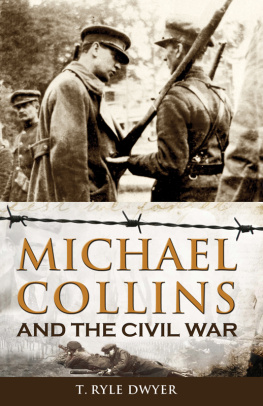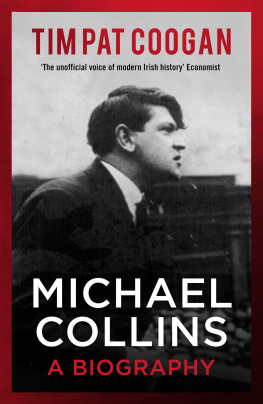ACKNOWLEDGEMENTS
This volume is based on the proceedings of a conference, attended by over 500 people, held at University College Cork on 28 February and 1 March 1997. We had repeated requests from many people to send on copies of the papers and there was an unprecedented interest in the publication of the proceedings.
In response to the academic and general interest in the papers, we undertook to bring out a volume on Michael Collins and the making of the Irish State within a year of the conference. Each of the contributors was asked to revise his or her contribution for publication in a book which has been designed to explore the different aspects of the political life of Michael Collins. We decided, therefore, to expand the scope of the volume in order to cover the life of Michael Collins not covered in the papers.
We are very grateful to each of those who gave papers at the conference and who prepared them for publication so promptly. Our gratitude to Professors Joe Lee, Ronan Fanning, Tom Garvin and Eunan OHalpin, Drs Deirdre McMahon, Martin Mansergh, John Regan and Diarmuid Giollin and Commandant Peter Young.
We also examine the west Cork background of Collins and include a paper on the career of Gearid OSullivan, his aide de camp. (The men had been due to marry Kiernan sisters in a joint wedding ceremony until Collins death intervened). Due to a mistake in the editing process for the first edition, this paper was incorrectly attributed to his son, Fr Gearid OSullivan. In fact the author was another native of west Cork, Philip ORegan, and as editors we are pleased to take this opportunity to correct this error and delighted to acknowledge Philips contribution to the volume.
Margot Gearty, another contributor to this volume, also had a Kiernan connection, being the niece of Kitty, Collins fiance. Ms Geartys essay, written with great sensitivity, sheds new light on the Kiernan family and on the first contacts between the Kiernan sisters, Michael Collins and Gearid OSullivan.
We also decided to add essays on Collins and Northern Ireland. Dr amon Phoenix kindly obliged at short notice and contributed a strong chapter based on primary source research. Finding that no work had been published on the role of Michael Collins as Minister for Finance, we commissioned a piece from Dr Andrew McCarthy.
We are delighted that Mary Banotti MEP found the time to prepare the introduction to this volume during the middle of a very busy presidential campaign. We thank her for this and for her very gracious speech which opened the conference proceedings.
Thanks are due to Professor Denis Lucey, Peter Barry, TD, Gearid OSullivan, Catriona Crowe and Jim McLoughlin for chairing the various conference sessions.
We would like to thank President Michael Mortell of UCC, Mr Gerry Reynolds of Radio Telefs ireann, Bord Gis, The Examiner and the UCC History Department for their generous offers of sponsorship for the conference.
RT and Cork Campus Radio performed a very valuable service in recording the proceedings, and Aidan Stanley used this material to prepare three programmes which were broadcast on RT radio in August 1997.
Ted and Alan Crosby from The Examiner gave great support and encouragement to the conference. A specially-commissioned Michael Collins supplement was produced by the newspaper, under the expert supervision of Dan Buckley and Liam Moher. We also wish to acknowledge our thanks to Lilian Caverly for her help in securing illustrations for the book, and we thank The Examiner for permission to reproduce those photographs.
We would like to thank Commandant Peter Young, Director, Commandant Victor Lang, and the staff of the Military Archives, Cathal Brugha Barracks, for their extensive help in the preparation of this volume. We are very grateful for the generous access given to the extensive collection of unique photographs in their archives, a number of which they kindly allowed us to reproduce in this volume.
We are grateful to Charlotte Holland, Norma Buckley, Veronica Fraser and Deirdre OSullivan, secretaries in the Department of History, University College Cork, for their untiring efforts in assisting with both the conference and the preparation of this volume.
We thank the following postgraduate students of the Department of History, University College Cork, who volunteered their assistance for the duration of the conference: Bronagh Allison, Suzanne Brennan, Tracey Connolly, James Cronin, Pat Cullen, Robert MacNamara, Michelle OMahoney.
Thanks are due to all the staff of the Printing Office in UCC for their help in producing material for the conference.
We would also like to thank Lucette Murray for her help in publicising the conference.
We are grateful to Denis Bannon and the other staff of ras na Mac Leinn for their help in staging the proceedings.
We would also like to thank Fr Gearid OSullivan for the photograph of the wedding of Gearid OSullivan and Maud Kiernan, 19 October 1922.
We would like to thank the staff of Mercier Press for producing this handsome volume in such a short time.
GABRIEL DOHERTY
PROFESSOR DERMOT KEOGH
THE CHALLENGE OF A COLLINS BIOGRAPHY
J. J. Lee
It cannot be credibly claimed that Michael Collins has been neglected by historians and biographers. If anything, the contrary is the case. For one whose public career was compressed into a few short years, and who died at the age of thirty-one, he has attracted intense biographical attention by Irish standards. More words have probably been written about him than about Eamon de Valera, whose public career spanned sixty years. Far more work has been devoted to him than to Arthur Griffith, founder of the original Sinn Fin, and leader of the Treaty delegation. Of the remaining four members of the Sinn Fin cabinet that split over the Treaty in December 1921, only a handful of biographies have been, at most, devoted to Cathal Brugha, Austin Stack and Robert Barton, and it is only very recently that any biography at all has engaged with W. T. Cosgrave, who would succeed Collins in 1922 to become effectively Prime Minister for ten years. Even the most celebrated 1916 leaders, Patrick Pearse and James Connolly, have attracted far fewer biographers than Collins, with Thomas MacDonagh, Sen MacDermott, and Tom Clarke attracting fewer again.
Of others active in the War of Independence and Civil War, Constance Markiewicz is out on her own, with four biographies. Richard Mulcahy, Kevin OHiggins, Eoin MacNeill, Erskine Childers and Liam Mellows have to make do with one or two. Personalities as prominent as Desmond Fitzgerald, Ernest Blythe, Fionn Lynch, Paddy Hogan, Joe McGrath, and Eamon Duggan, still await any biographer at all. Looking somewhat further ahead, few of even the leading ministers in the governments of the Free State and the Republic have attracted a single biography, despite the long records of public service of men like Sen MacEntee, Frank Aiken, Paddy McGilligan, Gerry Boland, P. J. Ruttledge, Sen T. OKelly, John Marcus OSullivan or even John A. Costello, twice Taoiseach, for whom we still need biographers.
On the face of it, then, Collins is relatively well served, at least if the number of words written about him be the criterion. And in addition there is now the Neil Jordan film to bring his name before a much wider audience. Nevertheless, it is easy enough to understand the feeling that we are in many respects still scratching the surface.
One reason is that it is only recently that some essential sources have begun to become available. Apart from important archival sources remaining closed, there was naturally a great sensitivity among survivors concerning the Civil War. As that generation remained active in politics for more than forty years, neither their papers, nor much of their information, would begin becoming available, for the most part, until quite recently. And there was, particularly in the case of Collins, a reluctance among some of his enemies to confront their possible responsibility for his death, and a reluctance among some of his friends to probe too closely in case their hero turned out to be all too human, and a reluctance among some of his other colleagues to encourage exploration in case their connection with him might be exposed as one more of convenience than conviction.


